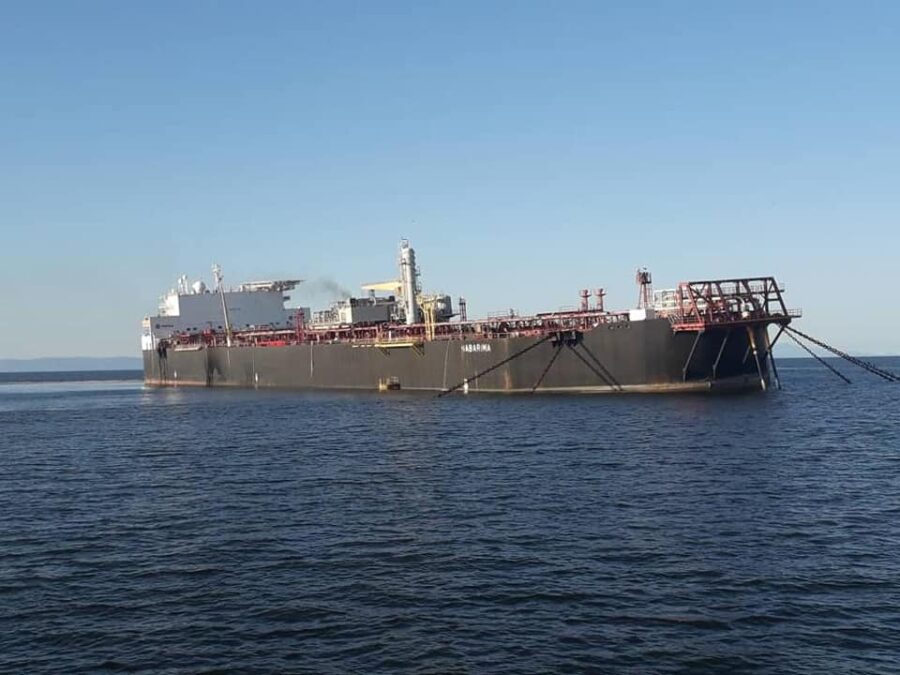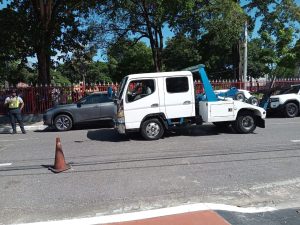By Sue-Ann Wayow
THE FSO Nabarima poses no immediate threat to Trinidad and Tobago according to the report compiled by the local team who investigated the Venezuelan vessel earlier this week.
Results of the report were disclosed at a joint press conference on Thursday held by the Ministry of Energy and Energy Industries and the Ministry of Foreign Affairs.
Both Energy Minister Franklin Khan and Foreign Affairs Minister Dr Amery Browne said they were pleased about the report from the Trinidad and Tobago delegation led by a Senior Petroleum Engineer at the Ministry of Energy and Energy Industries and consisted of an Engineering Officer/Mechanical Engineer from the Coast Guard, and a Port State Inspector from the Maritime Services Division of the Ministry of Works and Transport.
According to Khan, the report concluded that “The FSO Nabarima was upright and stable with no visible tilt and there was no imminent risk of tilting or sinking at this time.
“There was no water ingress on the vessel visible to the team. It was confirmed from the representatives that during the incident when the engine room was flooded and there was no mixing oil and bilge water. The oil did not leak from the containment tanks. The double hulls are intact and pose minimal risk of an oil spill at this time.”
Giving a history of the vessel’s operations, Khan said the FSO Nabarima has been operating for over ten years in the area, without problems. However, since the United States imposed sanctions on Venezuela, the crude could not be exported, and therefore the tanker had oil stored on board.
The vessel is located 17 miles west of the international border between Trinidad and Venezuela in Venezuelan territory in the Gulf of Paria.
The team on Tuesday, was transported to the vessel via helicopter and was therefore privy to aerial views as well. Khan emphasised that the helicopter would not have been able to land on the vessel if there was any tilt.
The minister said the TT team was greeted by major Venezuelan personnel including the vessel’s captain and marine superintendent and spent approximately three and a half hours aboard the vessel that contains 1.3 million barrels of oil.
Khan said all major areas were toured including the engine, generator room, boiler room, machine control and tank control rooms , the main deck, the pumps and all other relevant areas on the vessel.
He said the Venezuelan authorities were honest in the information provided admitting that there were previous problems, which have since been rectified, information confirmed in the report from the team.
Additionally, major maintenance is ongoing and pumps and electrical motors are being repaired as needed.Khan said, “All in all, the team was happy that the vessel has no tilt, the vessel was not taking in water, and all the operating systems were functioning at a level that was acceptable.”
The visit to the vessel comes after numerous calls from groups and the public for Government to intervene and prevent what many described as one of the worst environmental disasters waiting to happen.
Browne stated that since the issue was raised, there was immediate and consistent communication with Venezuelan authorities, interactions with the United States embassy, Caricom and other agencies.
Initially, September 28 was agreed upon for the TT team to have a site visit but it was postponed to October 20, he said.
One of the recommendations made by the team is for another follow-up visit to be conducted within a month’s time.
And Khan added that there was concern of the length of time it will take to transport the oil to another location, about 35 days with the vessels presently being used.
The suggestion will be made to Venezuela to utilise larger vessels to offload the crude oil from the FSO Nabarima to be taken to another location which is believed to be onshore.
“The transfer process that is taking place although it is slow, it is considered very safe,” Khan said.
![]()










